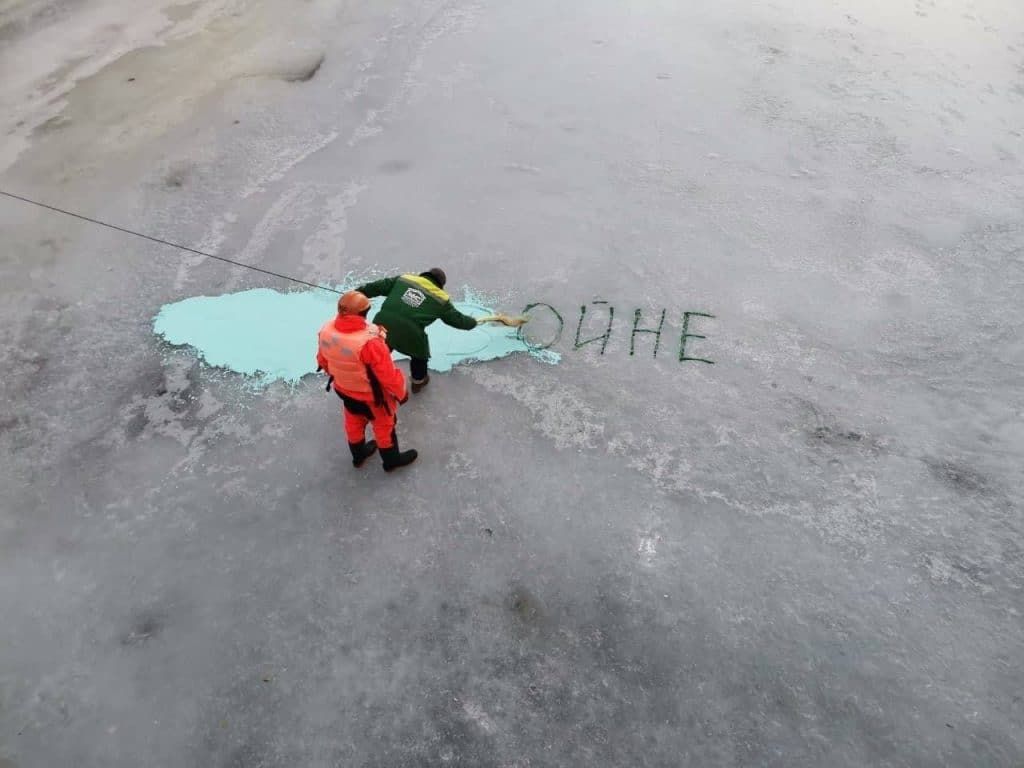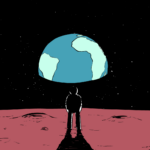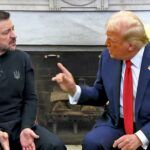Letter from St. Petersburg, a year in: Russia is still not at war.
By Anonymous Author | February 24, 2023
 City utility workers paint over a “No to War” message carved into ice on the frozen Moyka River in St. Petersburg, Russia. Twitter/@EilishHart
City utility workers paint over a “No to War” message carved into ice on the frozen Moyka River in St. Petersburg, Russia. Twitter/@EilishHart
A year later, Russia is still not at war.
“One year ago, to protect the people in our historical lands, to ensure the security of our country and to eliminate the threat coming from the neo-Nazi regime that had taken hold in Ukraine after the 2014 coup, it was decided to begin the special military operation. Step by step, carefully and consistently we will deal with the tasks we have at hand.”
– Vladimir Putin, President of Russia, 02/21/2023.
***
Charles Strozier recently wrote in the Bulletin that “wars tend to begin with enthusiasm and the certainty of early victory.” I don’t doubt it. This is why there was no public enthusiasm in St. Petersburg when the “special military operation” began. Because it isn’t a war.
Shortly after Russian tanks rolled onto Ukrainian territory and Russian ballistic missiles hit Kyiv on February 24 2022, I noted a curious fact: Most people around me on the streets of St. Petersburg had little understanding of what their country’s armed forces were doing. They knew that something was happening in Ukraine, but they assumed that it was not a big deal. I made a point of asking people—friends and acquaintances, people on the street and people working the shop counters—“what do you think, are we shelling Kyiv? Are we shelling Ukrainian cities?” And I found that many people without personal connections abroad said, “No, of course not. What a crazy idea.”
A year later, the war has still not begun. Martial law has been “partially” implemented, hundreds of thousands of men have been mobilized, international borders breached, Ukrainian cities and villages razed to the ground with their residents, and then “returned home” to Russia. But Russia is not at war, despite what the western press tells you. A new Russian law forbids disseminating any information about the Russian Armed Forces except that which is published by official state sources. This includes calling the special military operation a war, an occupation, or an annexation. The law carries a maximum sentence of 15 years.
The conceptual murkiness of not calling the war a war is often explained as an ideological smokescreen put up by the state to allow people to stay apolitical—because, as Joshua Yaffa put it in the New Yorker last March, “a full-fledged war with Ukraine would be a difficult concept to sell to most Russians.” Last March, I thought this way too. But today I think otherwise. I think that there is a logic to this special military operation that commands our attention. There is a reason why it is not a war, and this reason helps explain both the Russian state’s foreign policy and the Russian public’s reaction.
Put simply: the “Special Military Operation” is not a war because Ukraine cannot be a legitimate foe.
“Ukraine actually never had stable traditions of real statehood,” Putin explained in February 2022. From this, it follows that Ukraine is not a sovereign nation. It is a historical mistake, ruled by a “Neo-Nazi” puppet regime, funded and armed by the amorphous West. The amorphous West changes. Sometimes it’s the USA, sometimes it’s NATO, “Western elites,” the “Anglo-Saxons” or the “Golden Billion.” But whatever it is, Russia cannot declare war on Ukraine because it apriori does not recognize Ukrainian sovereignty. “We are not at war with the people of Ukraine,” Putin declared in February 2023: “I have made that clear many times. The people of Ukraine have become hostages of the Kiev regime and its Western handlers, who have in fact occupied that country in the political, military and economic sense and have been destroying Ukrainian industry for decades now as they plundered its natural resources.” The special military operation has served to right this historical wrong; it is now Russia that plunders Ukrainian natural resources, metal, and grain.
In the rationale of the special military operation, national borders are rather like force-fields; jurisdiction is defined by cultural and linguistic consanguinity, not by the letter of international law. And, as Putin reminds us, Russian language and culture has historically spread all the way through Ukraine. This is “historically Russian land,” he explained, a place where Russia has “legitimate interests.” “We have no borders with Ukraine,” explained Vladimir Zolotov, head of the National Guard, on the eve of the invasion. “Our border is with the Americans because they are the owners in that country. Everyone else there is their vassal.” From this point of view, even overtly genocidal claims about the extermination of Ukrainian culture and language may legitimized as decolonization.
Putin’s 2020 overhaul of the Constitution named the Russian ethnicity “state-forming” on the basis of language. The new Article 68 states: “Throughout the territory of the Russian Federation, the state language is Russian, recognized as the language of the state-forming ethnicity, which is part of the multiethnic union of equal peoples of the Russian Federation.” (Might it follow from this that everywhere people speak Russian, Russia has a legitimate claim?). Propaganda videos show young people of different ethnicities all walking together. Each of them says, “I’m Tadjik,” or “I’m Dagestani,” or “I’m Jewish” and so on, and then in unison they all recite, “We’re Russians! We’re together! Vladimir Vladimirovich, we’re with you!”
This is the Russian World. Welcome.
***
Even while ethnic minorities are sent to the front lines at disproportionate rates, the ideological image claimed by this Russian World is one of cultural inclusivity rather than exclusionary racism. And many people in Russia find it convincing. In late summer 2022, I struck up a conversation with a housekeeper in a hostel in Pskov. She told me that COVID-19 (she called it “covidla”) was spread by NATO from airplanes, and that the special military operation would bring Ukrainians back on the rails. “They’ve stopped teaching their kids to speak decent Russian!” she said, recalling how she had once visited Ukraine and met a little boy who did not understand her. But anyway, she said, “what I want to know is, will Poland manage to take Lvov from us? What do you think?”
As with the American War on Drugs, the Russian World’s special military operation needs no public enthusiasm; the public is simply told that the public order demands it. It is a police operation, a task for the anti-terror brigade. It recognizes no legitimate foe and therefore it tolerates no legitimate resistance. You do not resist the police. If you do, you get hurt, and then it’s your own fault. This is the logic. “We want those who seized and continue to hold power in Kiev to immediately stop hostilities,” Putin declared in Feb 2022. “Otherwise, the responsibility for the possible continuation of the bloodshed will lie entirely on the conscience of Ukraine’s ruling regime.”
I often hear people recite some version of this argument. Last March, while the Russian Army was shelling Mariupol, a friend of mine explained why it was the Ukrainian army’s fault. It was their fault, he said, for not giving up. “Had they just surrendered the city, no one would have been hurt.” Many people have told me this, or something similar. And some of them—many of them—are not evil people. But they think like cops.
Mariupol is on people’s minds a lot. And it’s in the news often. In June 2022, St. Petersburg and Mariupol became sister cities. St. Petersburg was called to rebuild its destroyed sister. This winter, a kitschy sculpture of interlocked hearts was erected in the Palace Square for the holiday season; it was defaced with antiwar slogans, removed, and then erected again under police guard.
Electricians, water engineers, public transportation experts, and many other brigades of skilled municipal workers are regularly sent down to Mariupol on two-week work trips. Individual citizens are also asked to help out. Billboards this summer thanked people for sending down what they could afford: children’s formula, clothing, medical supplies. And many people did. Not to abide by the billboards, but because Russia and Ukraine are close—both geographically and socially. Many people in St. Petersburg have friends and relatives who have been killed and wounded; who have lost family, friends, pets and documents; who have seen their most prized possessions destroyed when their apartments, houses, and workplaces burned.
If one of your friends was killed in a besieged city, wouldn’t you do everything in your power to help his widow and child? This is what happened to us. We’ve been sending aid down since early summer, to our friends and their friends, and to friends of friends, acquaintances and colleagues and newly made friends. We do this not because of the patriotic billboards but despite them. On both sides of the newly effaced international border, social ties run deep in desperate times. Social networks have a propensity to proliferate. And the worse things get, the quicker and tighter these relationships form.
Through these networks we’ve met many new people. Some of them know who destroyed Mariupol, others do not. Some of them are stumped by the simple question: “Who attacked whom on Feb 24th 2022?” Some of them know which country breached international borders with its tanks, planes and armoured personnel carriers. Others have never thought to ask themselves such a question.
A few months ago, a woman stopped by with several good child-sized down jackets to send to Mariupol. I didn’t know her. She was an internet friend of a friend, and she wanted to help. She seemed genuinely appalled by what she knew about the violence and suffering. But what happened to Mariupol? She knew that there was “a terrible civil war” in eastern Ukraine but, she told us, she never could quite iron out the details. We told her that the Russian military razed the city, and she didn’t believe us. When we showed her videos, she started to cry. “How do we go on living, now,” she asked, through the tears, “if this is true?” And then she left and disappeared from our lives completely. We never heard from her again.
Together, we make the world safer.
The Bulletin elevates expert voices above the noise. But as an independent nonprofit organization, our operations depend on the support of readers like you. Help us continue to deliver quality journalism that holds leaders accountable. Your support of our work at any level is important. In return, we promise our coverage will be understandable, influential, vigilant, solution-oriented, and fair-minded. Together we can make a difference.
Keywords: Russia, St. Petersburg, Ukraine, anonymous author, invasion, special military operation
Topics: Special Topics
















Why is the author anonymous
The author is anonymous because it’s illegal to tell the truth about the Russian war on Ukraine in Russia. Many have been imprisoned just for calling the war a war, or for offering the simplest protest against the Russian invasion. This article is important precisely because it shows us how complete the control of information can be in a totalitarian state. Those who have the critical faculties to read through the official propaganda and the unofficial cheerleading and spin understand what’s going on. Those without the will or the capacity to know and understand what their country is actually doing… Read more »
Just to mention one case. A man, Alexei Gorinov, got 7 years in prison for speaking out against a proposal to hold a children’s dance and drawing competition because he said it’s inappropriate at the moment “when there are children dying every day.” There is an article about him on Wikipedia if you want details. He did not DO anything, he just spoke at a session of the Deputy Council of a Municipal District in Moscow. An article like this one would be a clear case for persecution from the Russian government. They now have a special law for it,… Read more »
Fascinating ….. shows what a total control by KGB and propaganda machine can do to a country, but, also shows what people will do not to know (head-in-the-sand mentality). Reminds of many who do the same to climate change warnings. “Ignore it, and it will go away”! But, it won’t……. The question is how do you get reliable, believable information about Putin’s war into Russia ? Maybe there are a few citizens who will get their heads out of the sand!